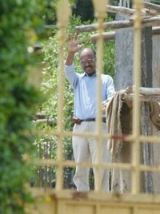Two Ethiopian opposition leaders put under house arrest
By ANTHONY MITCHELL
ADDIS ABABA, Ethiopia, June 11, 2005 (AP) — Ethiopian authorities placed two opposition leaders under house arrest Saturday, saying they were threatening the security of the state and were behind a week of protests that saw police fire on demonstrators, leaving 29 dead.

|
|
The leader of the Coalition for Unity and Democracy Hailu Shawel wave behind a gate at his house, Saturday, June 11, 2005 in Addis Ababa in Ethiopia after he and a senior official of the opposition party, Lidetu Ayalew were put under house arrest. (AP). |
Information Minister Bereket Simon accused the main opposition Coalition for Unity and Democracy of reneging on an agreement struck Friday with the ruling party and another opposition coalition to work together to end protests. The government has accused the opposition of engineering the protests by students and others angered that the ruling party has claimed victory in recent parliamentary election. The opposition denies it orchestrated the protests, but has said the elections were flawed by fraud and violence.
After signing the peace agreement, the Coalition for Unity and Democracy accused the ruling party of continuing to arrest its supporters and said the deal was “not worth the paper it is written on.”
The leader of the Coalition for Unity and Democracy Hailu Shawel and another senior official, Lidetu Ayalew, were placed under house arrest Saturday.
Hailu’s coalition is “once again showing us their commitment to violence and the government will not shy away from ensuring the peace and security of the country, that is why we have taken these steps,” the information minister said. He said the coalition’s “leadership is composed of extremist groups. One needs to take measures to ensure the peace and security of the country ….”
The minister had earlier rejected international condemnation of the government for the violence, saying the opposition bore responsibility for the unrest.
The streets of the capital, Addis Ababa, were quiet Saturday. Taxi drivers continued their strike protesting the violence.
Tim Clarke, the European Commission chief in Ethiopia, who helped negotiate the agreement between the parties, was trying to help secure the opposition leaders’ release.
Journalists who had gone to Hailu’s house to check reports he was under house arrest were beaten by police using fists and clubs. Diplomats who arrived later were searched under protest and at least one was pushed and shoved by soldiers.
“This is absolutely disgraceful,” Clarke said of the behavior of the soldiers. In a phone call to Information Minister Bereket from outside Hailu’s home, Clarke could be heard saying diplomats had been assaulted.
Earlier Saturday, Ethiopia’s royal family warned that the country is in “grave danger.”
In a statement released by the grandson of Ethiopia’s former Emperor Haile Selassie, they called on political parties to refrain from igniting ethnic hatred for political gain. Prince Ermias Sahle-Selassie Haile-Selassie, who lives in the United States.
Prince Ermias’ grandfather’s 44-year reign ended when a military junta led by Haile Mariam Mengistu staged a bloody coup in 1974. That military junta was in turn overthrown in 1991 by the now-ruling Ethiopian People’s Revolutionary Democratic Front.
Ethiopia’s ruling party, which has pledged itself to democratic reform but shown authoritarian tendencies, claimed victory in last month’s elections based on provisional results.
The violence that has followed threatens to destabilize Ethiopia, one of the poorest countries in the world, which faces cyclical drought and widespread hunger. It also could strain Prime Minister Meles Zenawi’s dealings with the international community.
Meles is a member of British Prime Minister Tony Blair’s Commission for Africa, which has called on the developed world to increase aid and trade to Africa and decrease its debt and called on African leaders to embrace democracy and improve their citizens’ security.
In London, Britain’s Conservative Party has questioned Thursday whether Meles should remain on the commission.
The U.S. government has touted Meles as a progressive African leader and a key partner in the war on terror; U.S. troops have even trained with Ethiopian troops that patrol the porous border with Somalia.
The United States on Thursday urged all sides to show restraint
